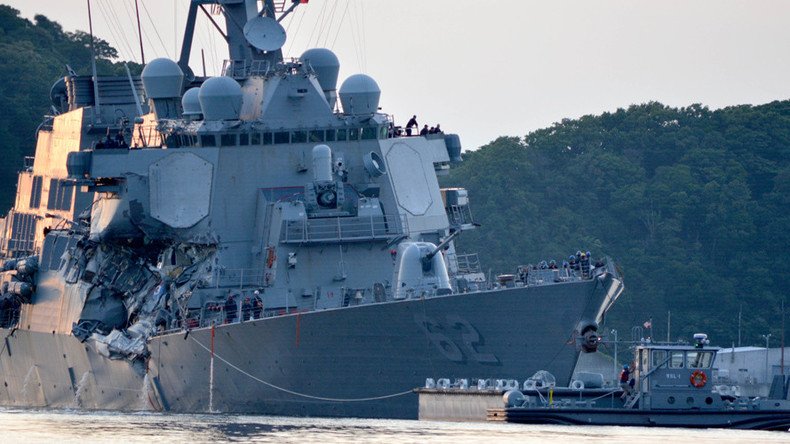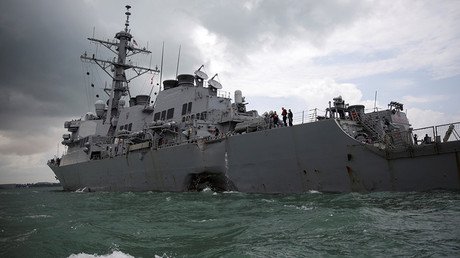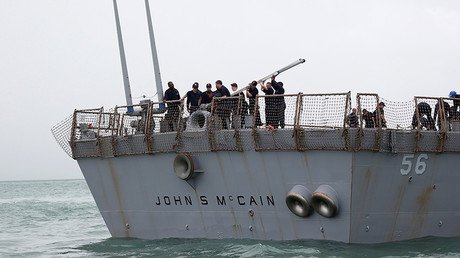‘We allowed standards to drop’: US Navy officers testify on warship collisions

The US Navy has compromised its standards in order to meet high operational demands, a top admiral acknowledged at a Congressional hearing on a series of recent collisions involving US warships in the Asia-Pacific.
Admiral William F. Moran, the vice chief of naval operations, conceded that the Navy had accepted higher risks with uncertified ships and crews, but said it was done to meet increasing operational demands.
Navy commanders have approved numerous waivers to expiring certifications of standards, such as seamanship, Moran told the Seapower and Projection Forces Subcommittee of the House Armed Services Committee on Thursday.
“We have allowed standards to drop as the number of certifications has grown,” Moran said. The Navy is under great strain, the admiral noted, deploying about 100 ships around the world each day.
Moran said it was “premature” to draw conclusions from the collisions involving USS Fitzgerald and USS John S. McCain this summer which killed a total of 17 US sailors, since investigations into both incidents were still ongoing.
“To put that in perspective, these heartbreaking casualties are more than the number of [American] servicemembers that we have lost in the Afghanistan war zone in the 2017,” Representative Joe Courtney (D-Connecticut) said at the hearing, as lawmakers demanded answers as to why US warships were involved in more accidents this year, than in any year over the past two decades.
Admiral Moran said the Navy is “shocked” by the collisions, and is carrying out a comprehensive review to fix the disturbing trend.
John H. Pendleton, a director of Defense Capabilities and Management at the Government Accountability Office (GAO), told lawmakers that 37 percent of the certifications for the crews of Seventh Fleet cruisers and destroyers based in Yokosuka, Japan, had expired. That was more than a fivefold increase since May 2015, he added.
“The Navy has had to shorten, eliminate, or defer training and maintenance periods to support these high deployment rates,” Pendleton told Congress, without directly addressing what caused the Fitzgerald and McCain incidents.
“The high operational tempo of ships homeported overseas had resulted in what Navy personnel called a ‘train on the margins’ approach, a shorthand way to say there was no dedicated training time set aside for the ships so crews trained while underway or in the limited time between underway periods,” Pendleton said.
Even though the Navy leadership has not directly attributed the recent collisions to the concerns raised at the hearing, Representative Rob Wittman, (R-Virginia), who heads the subcommittee, concluded that, “These negative training trends clearly contributed to the lack of seamanship evident onboard the USS John McCain and the USS Fitzgerald.”
In August, the McCain, a guided-missile destroyer, collided with a commercial oil tanker east of Singapore. Ten sailors were killed in the incident. The collision tore a gaping hole in the McCain’s left rear hull and flooded adjacent compartments, including crew berths, machinery and communication rooms.
In June, the Fitzgerald collided with a container ship off the coast of Japan, killing seven American sailors.
“Clearly at some point, the bridge team lost situational awareness,” Admiral Moran told reporters in August.
Following the McCain incident, the Navy dismissed Seventh Fleet commander Vice Admiral Joseph Aucoin “due to a loss of confidence in his ability to command,” Admiral Scott Swift said on August 23.
'Operational pause': Navy orders review into 'root causes' after USS John S McCain collision https://t.co/bwUvIvDiJY
— RT America (@RT_America) August 21, 2017
A week earlier, the Fitzgerald’s captain and other sailors were punished after poor seamanship and flaws in keeping watch were found to have contributed to its collision.
This year, there were two other accidents involving US warships in the Asia Pacific, but no injuries were reported.
“While each of these four incidents is unique, they cannot be viewed in isolation,” Swift said. Citing the incidents, the Navy briefly suspended operations of all US fleets in late August.














